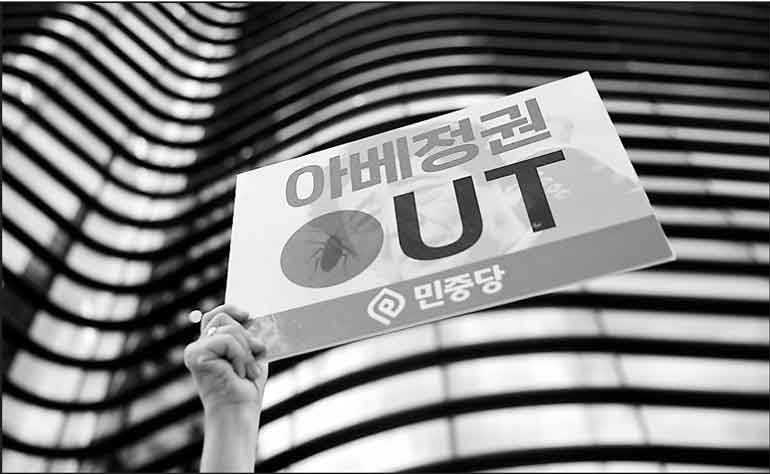Sunday Dec 21, 2025
Sunday Dec 21, 2025
Saturday, 3 August 2019 00:05 - - {{hitsCtrl.values.hits}}

A protester holds up a sign during an anti-Japan rally in front of the Japanese embassy in Seoul, South Korea. The sign reads "Abe regime OUT" - Reuters
TOKYO/SEOUL (Reuters): South Korea fired back at Japan over a deepening trade dispute on Friday, pledging it would not be “defeated again” by its neighbour, laying bare decades-old animosity at the root of a row over fast-track export status.
Addressing his ministers during a rare live television broadcast of his cabinet, South Korean President Moon Jae-in threatened countermeasures after Japan’s cabinet approved the removal of South Korea’s fast-track export status from Aug. 28.
Cutting South Korea from a so-called “white list” of favoured export destinations could require Japanese exporters to obtain permits, potentially slowing down exports of a wide range of goods that could be used to produce weapons.
Relations between the two US allies began to deteriorate late last year following a row over compensation for wartime forced labourers during Japan’s occupation, but the language used by President Moon was the starkest yet.
“We won’t be defeated by Japan again,” Moon told his cabinet, pointedly invoking South Korea’s difficult history with Japan, which colonised the Korean peninsula before World War Two.
He described Japan as a “selfish nuisance” for disrupting the global supply chain, and aired suspicions over its motive for hobbling a rival economy.
Earlier in Tokyo, Japanese Industry Minister Hiroshige Seko told a briefing that the cabinet had taken the decision for national security reasons, and it was not intended to harm bilateral relations. South Korean officials have held a different perspective, particularly since last month, when Japan tightened curbs on exports to South Korea of three high-tech materials needed to make memory chips and display panels, threatening the global supply of chips.
Speaking in Bangkok, where he was attending a regional forum, South Korean Foreign Minister Kang Kyung-wha said Japan was acting in a “unilateral and arbitrary manner”.
“We’re gravely concerned by the decision to say the least, this coming in particular in footsteps of earlier decision that restricts some key export items to Korea,” Kang said.
While Japan justified its decision on national security grounds, it has also pointed to an erosion of trust since South Korean court rulings ordered Japanese firms to compensate wartime forced laborers. Tokyo says that issue was settled by a 1965 treaty that normalised ties between the two countries.
“We want South Korea to first create an environment in which we can have dialogue with trust. It’s South Korea’s responsibility to do that,” Industry Minister Seko said.
The rift is the latest example of how a decades-old disagreement has undermined relations between the two US allies, at a time when Washington wants them working closely together on North Korea. It also awkward economically, as both export driven economies are facing sliding demand from China.
Tokyo has been frustrated by what it calls a lack of action by Seoul after South Korea’s top court ruled last year that a Japanese steelmaker should compensate former forced labourers.
South Korea would be the first country to be removed from Japan’s white list, which currently has 27 countries including Germany, Britain and the United States.
Seko said Japan was unwilling to hold a dialogue until South Korea corrected a statement made at a July meeting between bureaucrats of the two countries.